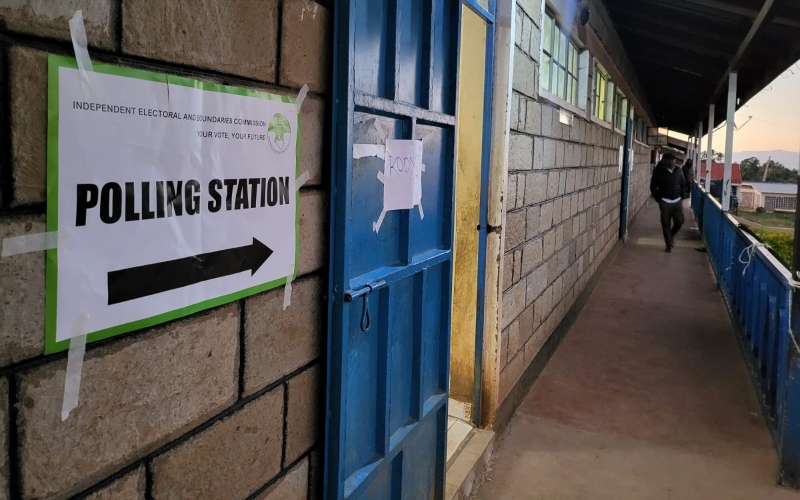12 matatu Saccos sue Nairobi County over eviction from three petrol stations

The petitioners, Ezekiel Oyugi and Joshua Karuu, named Nairobi City County as the primary respondent, alongside Total Energies (Rhino), Ola Energy (Afya Centre), and Ola Energy (OTC).
Tensions are escalating between matatu operators and the Nairobi County government after 12 Saccos filed a petition in the High Court seeking to stop their planned eviction from three petrol stations they have used as passenger terminals for decades.
The operators argue that the move will not only disrupt their daily operations but also affect thousands of commuters and threaten significant government revenue.
More To Read
- Relief for matatu operators after High Court halts eviction from CBD loading zones
- Sakaja, MCAs agree on new housing policy and tenant reinstatement plan
- Azziad Nasenya moves to court to stop auction of Sh20 million Kileleshwa apartment
- City Hall targets Eastleigh, Ruai, Kasarani in crackdown on illegal structures
- Saccos term petition to ban Matatus at fuel stations baseless, court told
- Sacco auditors face lifetime ban for failing to submit mandatory reports, regulator warns
In their legal challenge, the Saccos say the county’s eviction plan could impact the livelihoods of over 200,000 people who depend directly or indirectly on matatu services.
They further claim that the county earns approximately Sh200 million yearly from its licence fees, while the Kenya Revenue Authority (KRA) collects more than Sh2 billion in taxes generated from the same operations.
Through their chairman, Clinton Kioko Wambua, the Saccos told the court that they move over 100,000 passengers daily and, with the festive season approaching, expect to transport more than 800,000 travellers across the country.
They are asking the court to halt the evictions, emphasising that removing them from the stations would cause “turmoil in the transport sector.”
The petitioners, Ezekiel Oyugi and Joshua Karuu, named Nairobi City County as the primary respondent, alongside Total Energies (Rhino), Ola Energy (Afya Centre), and Ola Energy (OTC).
They accuse the county and the petrol companies of compromising public safety by allowing matatus to operate from petrol stations, which they say poses a risk to both passengers and other road users.
The petitioners also want the National Environment Management Authority (Nema) and the Energy and Petroleum Regulatory Authority (Epra) to revoke the licences of the fuel stations involved, citing breaches of environmental and safety regulations.
Oyugi and Karuu argue that continued use of the stations as matatu terminals violates Articles 42 and 69(1)(d) of the Constitution, which guarantee citizens the right to a clean and healthy environment and require public participation in environmental governance.
They propose that the matatus be relocated to Green Park Bus Station, which they argue is a safer and more regulated environment for passengers.
The Saccos involved in the case include Ena Investment, Transline, Prestige, Kinatwa, Makos, Kangema Travellers, Inter-County Travellers, and several others.
They maintain that they have operated at the disputed stations since 1985, making the eviction a sudden and disruptive move.
The High Court has scheduled the case for January 26, 2026, and directed the petitioners to serve all respondents within 14 days from October 13, 2025.
The outcome of this case is expected to set a precedent on how Nairobi County manages public transport operations at petrol stations and other private facilities.
Past regulatory attempts
City Hall has tried unsuccessfully to keep the public safe by ordering PSVs away.
In 2021, Umoja One MCA Mark Mugambi tabled a notice of motion in the assembly to lock out all matatus from petrol stations. He cites risks from the explosion of flammable materials.
That would make it illegal for public service vehicles within the CBD to use petrol stations as their drop-off and pick-up points. He wants violators punished.
"Petrol stations have always been considered danger zones. That's why signs tell motorists to switch off their engines and phones," he said.
He suggested that a few matatu operators have colluded with rogue county officials and converted petrol stations into working places.
“Public transport vehicles continue to violate public transport regulatory frameworks and safety standards for passengers by establishing petrol stations as pick and drop terminals," Mugambi said.
This endangers the lives of passengers and others despite safety signs and symbols, he said.
The legislator Section 11(g) of the Energy Act mandates Epra to, among others, require fuel dispensing sites to safeguard against fire accidents.
On October 3, 2019, Nairobi parking services instructed city petrol stations to lock out PSVs, saying they are not designated termini and PSVs pose risks to the public.
Saccos said the action was unfair because they were not consulted or given an alternative.
Mugambi said petrol stations store and sell highly flammable substances, including petrol and liquefied petroleum gas (LPG), that can explode unless safety measures are in place.
Top Stories Today
Reader Comments
Trending













































